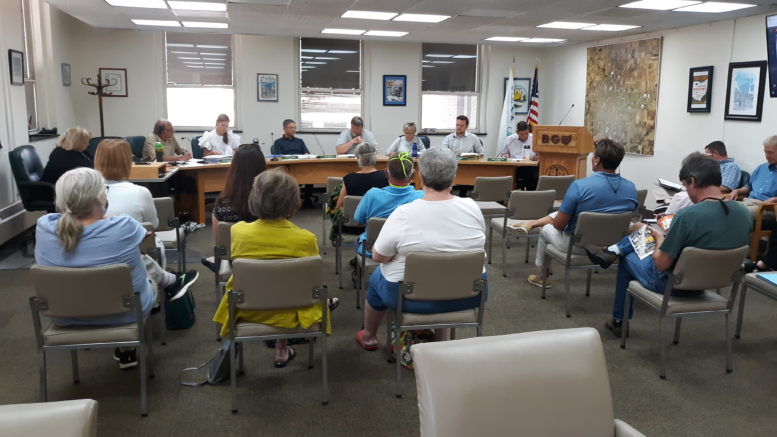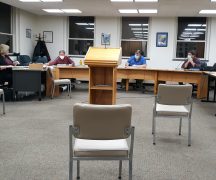By JAN LARSON McLAUGHLIN
BG Independent News
After 40 years of talking about rental housing conditions in Bowling Green, City Council waded through the proposed rental housing ordinance during a special meeting Thursday evening.
Some members were relieved that council was finally taking action. Some were frustrated that the action was not enough.
The council chambers was full of residents on both sides of the issue – landlords who say there is no need for inspections, and residents who are tired of the decline in housing. The public was not allowed to comment Thursday evening – though they have been given many chances in the past to voice their concerns.
After two and a half hours, council resolved some issues and left others hanging – like the provision to audit self-inspections by landlords.
Council President Mark Hollenbaugh predicted the ordinance would be introduced to council for the three required readings within the next month.
Two certainties in the ordinance are the requirements that all 7,000 or so rental units be registered with the city, and that all landlords self-inspect their rentals using a city checklist.
That did not sit well with some members of the Community Improvement Committee, which made recommendations for the ordinance to the city administration.
“I’ve expressed many times that I’m concerned with how self-certification heavy this is,” said council member John Zanfardino.
When the ordinance goes into effect in June of 2023, every rental property will start out with a clean slate. As the ordinance reads, it depends exclusively on self-inspections – until problems are reported that might trigger inspections by the city or a third party.
Council member Bill Herald pointed out that the ordinance was a “balancing act between the various stakeholders.” He suggested council trust but verify.
But after years of hearing complaints from tenants about living conditions, and complaints from landlords about not wanting to undergo inspections, Zanfardino said that trust in local landlords should not be automatic.
“I think that’s naive and defies human nature,” he said.
“You can have the best checklist on the planet,” but if property owners aren’t honest, it is meaningless, Zanfardino said.
“Without adding some third party inspections at the owners’ expense, we’ll be accomplishing virtually nothing,” he said.
City Attorney Mike Marsh objected to the characterization, saying that, “what we have now is absolutely nothing.” The new ordinance will hold landlords legally accountable, he said. They may be dishonest on the forms, but they will eventually get caught.
Marsh said that Mayor Mike Aspacher has made it clear that if landlords are not honest in their inspections, they will not like the tougher ordinance the city will enact.
Council member Jeff Dennis pointed out that of the 59 Ohio communities that have rental inspections, only five allow just self-inspections, and only one charges no fees.
“We are truly unique in how lax and ineffective this ordinance will be,” Dennis said.
“We’re backing away from what 55 cities do,” Zanfardino said, referring to council’s speed in acting on an ordinance as “glacial.”
“Over the last 40 years, when we have refused to act” other cities have created inspection programs, Dennis said.
Meanwhile, housing continues to decline, Zanfardino said. A planning expert identified the roadblock many years ago as “10 families who don’t want it to happen,” he said.
“There are folks that own 1,000 rental units in BG,” Zanfardino said.
“I have great concerns about self-verification,” he said. “The only way we’ll really have a feel for what’s out there is not self-certification.”
Herald agreed that the ordinance should have an inspection audit component.
Marsh said the ordinance authorizes the city to conduct audits.
“That’s not quite the same as requiring the audits,” or setting a threshold for inspection audits, Dennis said.
But Marsh suggested that the city tread carefully on random inspections or setting a minimum annual number of inspections. The city would need probable cause to get a search warrant to inspect a rental unit if the property owner objected, he cautioned.
Performing random inspections and setting a “quota” could put the city at risk legally, Marsh said.
“I agree there ought to be an audit mechanism,” but it must be a provision that doesn’t violate Fourth Amendment rights, Marsh said. “We always have the right to pursue inspections if we think something is going on.”
Hollenbaugh agreed, and urged council to base inspections on tenant complaints, survey responses, and police or fire division concerns.
“I think if someone lives in a crappy apartment, we’re going to hear about it,” Hollenbaugh said.
Council member Sandy Rowland said that many BGSU student renters don’t know how to spot furnace or plumbing problems.
Council member Rachel Phipps suggested the ordinance require that tenant education information be posted in each rental.
Marsh countered that at least five different agencies already provide that kind of information to tenants.
“But nobody is doing this,” he said, holding the proposed ordinance. “Things aren’t happening with rentals because they don’t get a flyer. But things may be happening because there aren’t inspections.”
The majority of council agreed with Phipps that tenant information should be part of the ordinance.
Rowland cautioned that the ordinance will not be perfect.
“This is a huge undertaking right now,” she said. “It will be very fluid. We want to be fair to everyone.”
“For 40 years people have wanted registration,” and landlords have protested having to pay for inspections, Rowland said. “We have to have buy-in to be successful. We need to get it started.”
It was agreed that the four-page checklist for inspections not be part of the ordinance because it is bound to change over time.
The city administration assured council that it wants the ordinance to lead to improvements in rental housing in Bowling Green.
“There is a segment of our housing stock that requires attention,” Aspacher said.
“We wouldn’t have spent all this time putting it together” if the city did not want the ordinance to have an impact, Marsh said.
The date for landlords to complete registrations on rentals was delayed until 2023 because of all the work it will take to create the database.
Hollenbaugh said the city may have to hire staff to manage the program and conduct inspections in the future.
“There are so many unknowns,” he said.





